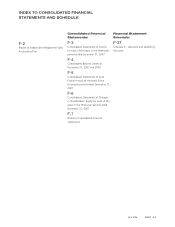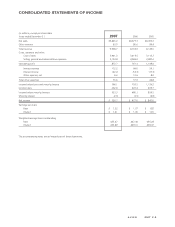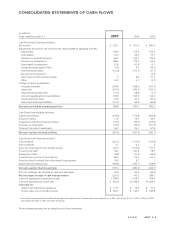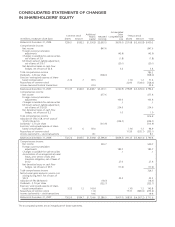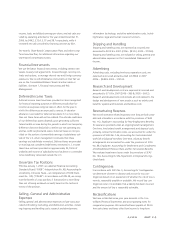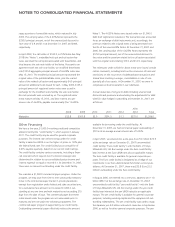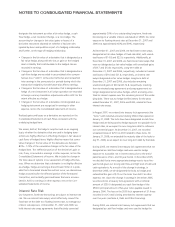Avon 2007 Annual Report Download - page 60
Download and view the complete annual report
Please find page 60 of the 2007 Avon annual report below. You can navigate through the pages in the report by either clicking on the pages listed below, or by using the keyword search tool below to find specific information within the annual report.NOTES TO CONSOLIDATED FINANCIAL STATEMENTS
the product life cycle, future marketing sales plans and dis-
position process. We assign a degree of obsolescence risk to
products based on this classification to determine the level of
obsolescence provision.
Prepaid Brochure Costs
Costs to prepare brochures are deferred and amortized over the
period during which the benefits are expected, which is typically
the campaign length. At December 31, 2007 and 2006, prepaid
expenses and other included deferred brochure costs of $40.8
and $37.2, respectively.
Property, Plant and Equipment
Property, plant and equipment are stated at cost and are depreci-
ated using a straight-line method over the estimated useful lives
of the assets. The estimated useful lives generally are as follows:
buildings, 45 years; land improvements, 20 years; machinery and
equipment, 15 years; and office equipment, five to ten years.
Leasehold improvements are depreciated over the shorter of the
lease term or the estimated useful life of the asset. Upon dis-
posal of property, plant and equipment, the cost of the assets
and the related accumulated depreciation are removed from the
accounts and the resulting gain or loss is reflected in earnings.
Costs associated with repair and maintenance activities are
expensed as incurred.
We capitalize interest on borrowings during the active con-
struction period of major capital projects. Capitalized interest is
added to the cost of the related asset and depreciated over the
useful lives of the assets. For 2007, Avon did not capitalize any
interest. For 2006 and 2005, Avon capitalized $1.0 and $6.6 of
interest, respectively.
Deferred Software
Certain systems development costs related to the purchase,
development and installation of computer software are cap-
italized and amortized over the estimated useful life of the
related project, not to exceed five years. Costs incurred prior to
the development stage, as well as maintenance, training costs,
and general and administrative expenses are expensed as
incurred. At December 31, 2007 and 2006, other assets included
unamortized deferred software costs of $95.9 and $74.7,
respectively.
Investments in Debt and Equity Securities
Debt and equity securities that have a readily determinable fair
value and that we do not intend to hold to maturity are classified
as available-for-sale and carried at fair value. Unrealized holding
gains and losses, net of applicable taxes, are recorded as a sepa-
rate component of shareholders’ equity, net of deferred taxes.
Realized gains and losses from the sale of available-for-sale
securities are calculated on a specific identification basis.
Declines in the fair values of investments below their cost basis
that are judged to be other-than-temporary are recorded in
other expense, net. In determining whether an other-than-
temporary decline in market value has occurred, we consider
various factors, including the duration and the extent to which
market value is below cost.
Goodwill and Intangible Assets
Goodwill is not amortized, but rather is assessed for impairment
annually and upon the occurrence of an event that indicates
impairment may have occurred. Intangible assets with estimable
useful lives are amortized using a straight-line method over the
estimated useful lives of the assets. We completed our annual
goodwill impairment assessment and no adjustments to goodwill
were necessary for the years ended December 31, 2007, 2006 or
2005.
Share-Based Compensation Plans
Prior to January 1, 2006, we applied the disclosure-only provi-
sions of Statement of Financial Accounting Standards (“SFAS”)
No. 123, Accounting for Stock-Based Compensation (“SFAS
123”). In accordance with the provisions of SFAS 123, we
applied APB 25, Accounting for Stock Issued to Employees (“APB
25”) and related interpretations in accounting for our share-
based compensation plans and, accordingly, did not recognize
compensation expense for stock options because we issued
options at exercise prices equal to the market value at date of
grant.
Effective January 1, 2006, we adopted SFAS No. 123 (revised
2004), Share-Based Payment (“SFAS 123R”), which revises SFAS
123 and supersedes APB 25. SFAS 123R requires all share-based
payments to employees to be recognized in the financial state-
ments based on their fair values using an option-pricing model at
the date of grant. We elected to use the modified prospective
method for adoption, which required compensation expense to
be recorded for all unvested stock options and restricted shares
beginning in the first quarter of adoption, based on the fair
value at the original grant date. The 2005 financial statements
were not restated. We elected to use the alternative short-cut
method to calculate the historical pool of windfall tax benefits
upon adoption of SFAS 123R in accordance with FASB Staff
Position (“FSP”) No. FAS 123R-3, Transition Election Related to
Accounting for the Tax Effects of Share-based Payment Awards.
For the years ended December 31, 2007 and 2006, we have
determined that we have a pool of windfall tax benefits.
The impact from the adoption of SFAS 123R during 2006, includ-
ing restricted stock units granted in connection with design
changes to share-based compensation plans related to the adop-
tion, decreased income before taxes and minority interest, net





